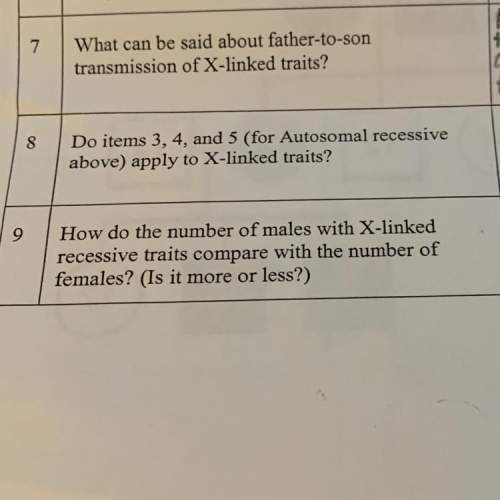
Biology, 13.01.2020 22:31 brittanyjacob8
Ascientist was studying a population of elephants. the first year, he counted a population of 80. over the next eight years, the population’s numbers were 94, 100, 103, 110, 125, 120, 125, 120. the population never exceeded 125. what is the carrying capacity for this population? 120 124 125 126

Answers: 2


Another question on Biology

Biology, 22.06.2019 06:30
Agroup of students is studying convection currents. they fill two identical balloons with the same amount of helium. one balloon is placed in a freezer and the other in an area with warm air. after 10 minutes, the balloons are released from a height of 1 meter. which of the following do the students most likely observe? question 8 options: the cold balloon expands and rises. the warm balloon shrinks and sinks. the balloons rise at the same rate. both balloons are the same size. the ballons both rise. the cold ballon is larger than the warm balloon. the warm balloon expands and rises. the cold balloon shrinks and sinks.
Answers: 3

Biology, 22.06.2019 09:50
Which statement describes compounds a. compounds are made of one type of atom. b. compounds cannot be represented by models. c. compounds are represented by chemical formulas. d. compounds cannot be broken down into simpler forms.
Answers: 1

Biology, 22.06.2019 10:30
The greenhouse effect a. something that has occurred for millions of years b. an unnatural phenomenon caused by humans that maintains earths temperature range. c. the results of the differences in the angle of the suns rays d. an unnatural phenomenon that causes heat energy to be radiated back into the atmosphere
Answers: 1

Biology, 22.06.2019 12:30
The table presents the average day and night temperatures in five cities. it also reveals whether a city receives substantial rainfall (wet climate) or little rainfall (dry climate). which city’s rocks are likeliest to experience frost wedging, and why? a) city a because the consistently subzero temperature would prevent water from melting b) city b because it is a wet region and the temperature fluctuates around the freezing point c) city c because it receives plenty of rain fall and the weather is moderately cool d) city d because the hot and dry weather would cause rocks to absorb water
Answers: 3
You know the right answer?
Ascientist was studying a population of elephants. the first year, he counted a population of 80. ov...
Questions


Computers and Technology, 25.03.2020 05:29



Computers and Technology, 25.03.2020 05:29

Mathematics, 25.03.2020 05:29







Mathematics, 25.03.2020 05:29

Computers and Technology, 25.03.2020 05:29


Mathematics, 25.03.2020 05:29




Mathematics, 25.03.2020 05:29




